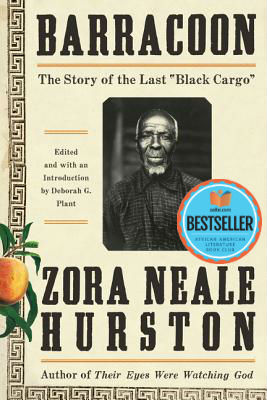Book Review: Barracoon: The Story of the Last “Black Cargo”
by Zora Neale Hurston and Deborah G. Plant
- 7 Time AALBC.com Bestselling Book!
- Selected for 3 Book Clubs’s Reading Lists
- An NAACP Image Award Honored Book
Amistad (May 08, 2018)
Nonfiction, Hardcover, 208 pages
More Info ▶
Book Reviewed by Amanda Robinson
American history is saturated with the flagrant oppression of African people and their descendants. We have recently been privileged insight into the life of Cudjo Lewis, who is believed to be the “last black cargo” after boarding the Clotilde in 1860. Gruesome details about his journey and subsequent life have graciously been released to us, thanks to Zora Neale Hurston’s recently published book Barracoon.
Before we get into the meat of the text, we are given a series of forewords, introductions and disclaimers. While most of the information was interesting, it felt exorbitant, and even redundant at times. However, I understand that some of it was essential because for many people who have never heard of Cudjo Lewis, this information offers historical context. There is even a glossary to reference that succeeds the story.
Undoubtedly, this book relentlessly pricked at my heart and caused me to sympathize with Lewis’ sorrowful account of a life packed with death, along with the ensuing and necessary adaptation. One thing that I loved about this book was Hurston’s ability to not impose her own thoughts and emotions into her portrayal of Lewis’ life. She was able to tell his tale organically, purely, and untainted. She even mastered the ability communicate his diction in a way that felt unsullied, which is necessary for an account such as personal as this one. While the language used did cause me to read slower in order to fully internalize Lewis’ words, this in no way felt like an inconvenience, and allowed me to partake in Lewis’ lamenting and extend my heart to his tale. Even at an old age, Cudjo Lewis was able to recall and express intimate details about his native home of Africa, his customs, his culture and the people he loved the most. He spent his entire life longing to return to the place from which he had been stolen.
I applaud Hurston’s ability to transform a series of fluid conversations into a format that mimics the layout of a chaptered novel. It is a narrative written and designed to be story like. Hurston masterfully captures her day-to-day encounters with Lewis, and readers are offered the opportunity to be partakers of their blossoming friendship and bond.
Cudjo Lewis’ story will live forever because of Zora Neale Hurston and her desire to shed light on his story and give his life a voice. This book is timely, for though legalized enslavement is over, there is still institutionalized oppression that parallels some aspects of Barracoon. Hats off to Hurston’s efforts to conquer such a task, and to her team as well for not letting these words die with either her or Cudjo Lewis. I greatly appreciate the Zora Neale Hurston Trust for preserving Hurston’s words and work, and for remaining persistent in making sure that Barracoon reached its full potential. This narrative is one that reminds us that the people and things that we love the most never leave us, for these people and things are etched into our hearts and minds.


